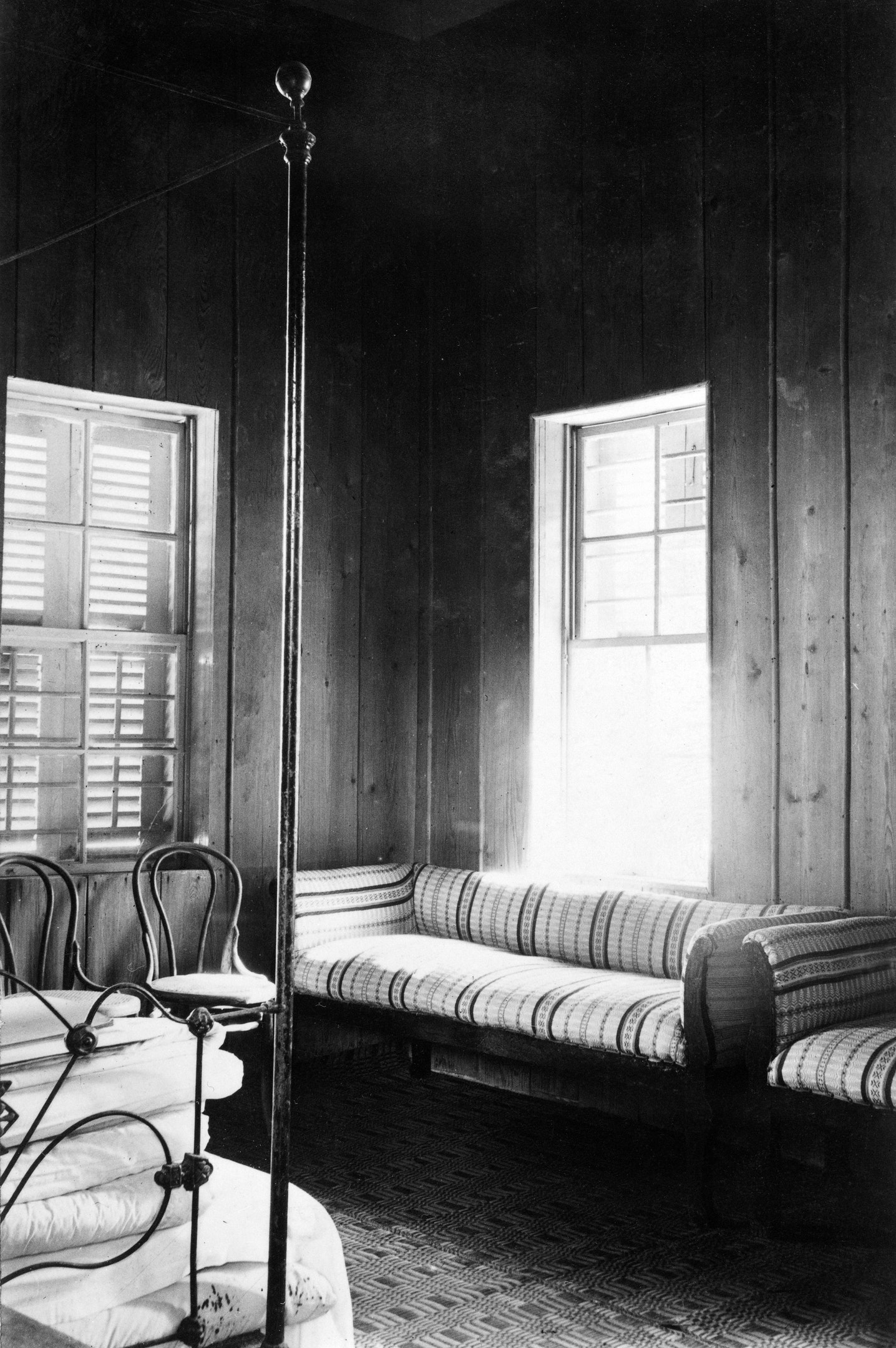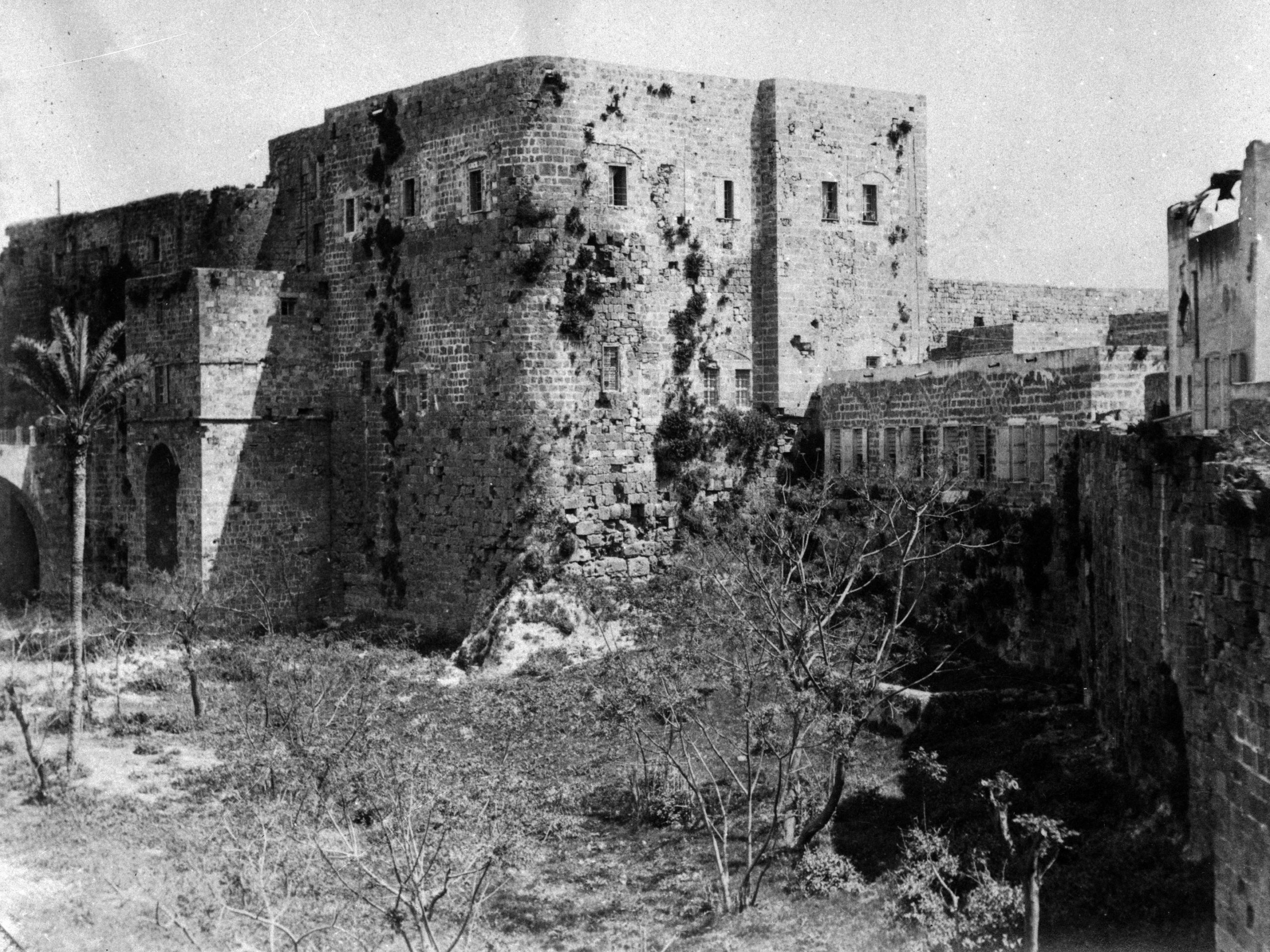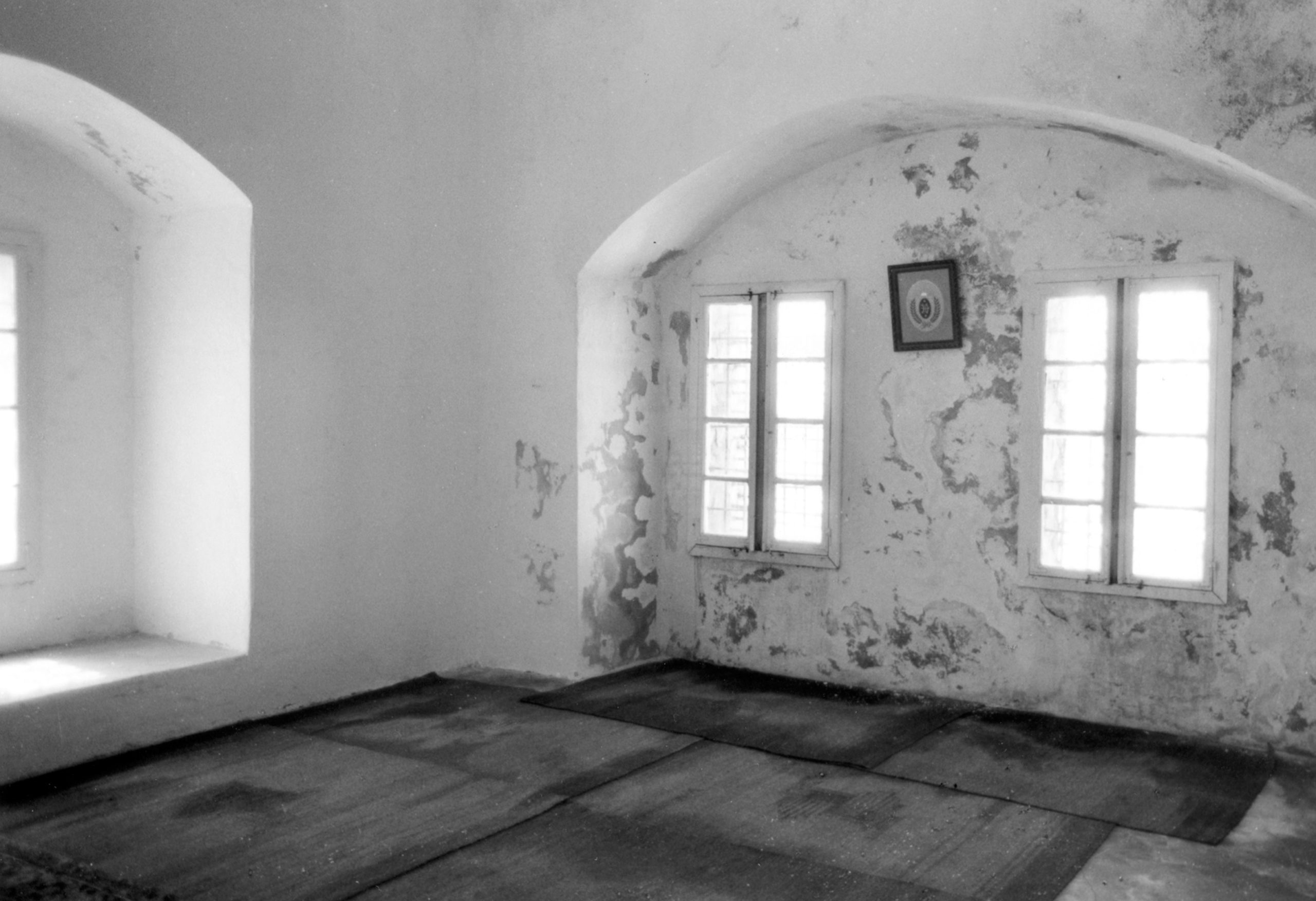We drove through the newer part of ‘Akká down to the great sweep of sandy beach where a stormy wind lashed the great breakers and drove them as far into the old city as possible. We turned left and wound our way over the hill down into the old city again. The wind blew everyone’s coat collar up around the neck. The day was still gray, misty and chill. The cold crashing of the surf punctuated the silent spots in our conversation as we stood, our backs to the sea wall, gazing across the way at the House of ‘Abbúd.
The sea, the wind, the swirling mist, none could cool down the ardor that stirred inside the pilgrim as he looked upon this gray shell of a house that once sheltered the Supreme Prophet of God. This was once the sanctuary of the Supreme Pen. Its walls had resounded to the words of the Most Great Book, the Mighty Aqdas. Here were formed the laws which would stand inviolate and unaltered for a thousand years. Here were fashioned the provisions which would lay the foundation for the greatest structure in the social history of mankind. Here, those ancient prophetic words had come true, “The Government shall be upon His shoulders.” Here, the Author of the Bahá’í Faith, protected by these blessed walls from the stinging winds of the sea, had poured out the fairest fruit of all His Revelation, the Aqdas—pre-eminent among all the writings which had streamed forth in a never-ending river from His holy pen.
What a plain, unimposing structure. Two stories in height with a small balcony around the second floor front, drab gray in color, bleak in appearance, beautiful to the believer.
We were all staring silently up at the balcony which surrounds the bedroom of Bahá’u’lláh. Many long hours He had paced this balcony, looking out over the sea and down upon the very earth where we were standing. This small balcony, which can be crossed in less than ten paces, furnished almost the only outside exercise for Bahá’u’lláh in seven long years of imprisonment within the walls of this house.

Before entering the House, we walked to the small public square in the rear. Our gracious host, Leroy Ioas, holding his hat and coat-collar against a wind that whirled tiny cyclones of ‘Akká dust across the courtyard, showed us the exact spot where the Master had stood and distributed alms and food to the poor.
Salah led us back between the houses and into the side door of the House of ‘Abbúd. We crossed an inner court and started up a flight of stairs, turning to the right twice and continuing to climb until we reached the living quarters of the Holy Family. We saw the small room that held thirteen believers the first night spent in this house. We saw the upper shelf which one of the friends had slept upon that first night and, rolling over too far to one side, had toppled down upon the Master.

We removed our shoes and walked across another room of soft carpets, through a small hallway and then turned left into Bahá’u’lláh’s bedroom. Against the wall on the sea-side of the room was a long cushioned bench. Upon the south end, toward Haifa, rested the táj of Baha’u’llah, marking the place where He often would sit. A few feet away, along the south wall, was a rocking chair which He used. Upon the floor, a carpet brought with them all the way from Adrianople.
As I write this now in Johannesburg, I am back there again. I can feel my pulse accelerate and my heart beat stronger. The atmosphere of these holy places never leaves you. It comes rushing back whenever you turn to ‘Akká and Haifa. Hour after hour, month after month, year upon year, Bahá’u’lláh had moved back and forth in this room. At times He would turn left in the doorway and go out on the balcony which runs across the front of the house. After Salah chanted a prayer, we followed Bahá’u’lláh’s path to the balcony and looked out upon the turbulent sea. The wind, it seemed to us, was still whipping up the indifferent Mediterranean and driving it toward the shore, where in mighty rollers it bowed and prostrated itself before the throne of Majesty.
The room of revelation (where Baha’u’llah revealed the Aqdas) is quite different from the others. This was also ‘Abdu’l-Bahá’s bedroom. It is paneled in wood which is to be found in other places associated with Him. This bedroom is in the back corner of the House. We could look down into the back courtyard. … We saw many of the books of ‘Abdu’l-Bahá, His writing equipment, papers, the simple iron bed—many things that were much loved by Him and are revered by all who look upon them.
Above all else, the mind tries to take in the truth that here in this room, a room that is simplicity itself, was revealed the Book of Laws, the Most Great Book, the mightiest written testimony since the beginning of our recorded times. Its Author would cast His Shadow of guidance for five hundred thousand years!
It is too much to understand. The mind willingly surrenders and turns to examine the surroundings, the little things it can comprehend. ‘Abdu’l-Bahá sat here, He walked here, He knelt here, He looked out this window. But irresistibly your thoughts keep coming back to that one inescapable fact—it was here that Bahá’u’lláh revealed the Aqdas.
Emptying yourself of every single thing to which the mind can cling, you ask Almighty God to pour into your heart a true appreciation of this experience you are undergoing. … The presence and significance of these holy places are like hammer-blows to those of us who have lived in a world so remote from the spirit.
Those veritably spiritual thunderbolts the Shrine of Bahá’u’lláh, of the Báb, and of ‘Abdu’l-Bahá, the room at Bahjí where Bahá’u’lláh passed away, the mansion of Mazra‘ih, the Garden of Riḍván—all had numbed the senses until the cup could not contain the flood.
Each of us said a prayer before departing from this cradle of future civilization. When we made our way downstairs, there was additional conversation, but none of it registers. The hearing was working, but the comprehension and recording instruments were unable to function. This was a mercy of God. The body must be much like an electrical system. It can successfully carry its normal “load” of power, but when subjected suddenly to an incredibly strong current, it “blows out” the fuse at its point of protection. A similar phenomenon happens to the pilgrim, several times, in fact. Something breaks the connection and permits no more impulses to register. The system cannot bear them. (Bahá’u’lláh has written of this spirit, saying of the wine of revelation that it is so inebriating to the Prophet, Himself, that the pen is stilled and can move no more.)

The sun came out gaily for a brief moment, for the first time, as we strolled through the picturesque streets of “Old ‘Akká.” It splashed against the drab earth-colored walls and transformed them into a happy tan. We traced our way along many of the favorite walks of the Master.
We paused and took photographs in the doorway of the house of the former Mufti of ‘Akká. He had been a bitter enemy of Bahá’u’lláh. Salah, caretaker at Bahjí, told us the story of the two attempts on the life of Bahá’u’lláh made by this Mufti while Bahá’u’lláh was still in prison. Once with a hidden dagger, but Baha’u’llah before admitting him to His presence said, “Let him first cleanse his hands.” A second time, the Mufti planned to strangle the Blessed Beauty, and Bahá’u’lláh said before admitting him, “First let him cleanse his heart.” The Mufti became an ardent believer and collected all the “traditions” to be found in the Faith about ‘Akká.
What a delightful city “Old ‘Akká” is to visit. Salah, who was born within its walls, greeted almost everyone. He told us many intriguing stories about its non-Bahá’í history as well. We entered a small door built in one of the lower walls of the prison, walked to the center of a cellar-like cavern. Below us excavation had been started. How strange to know that beneath the prison lies this famous church built by Richard, the Lion-hearted. The packed earth on which we stood was high up toward the top of the Gothic arches. The pillars were buried many, many feet in the solid earth below us.
Salah pointed out the house to which Bahá’u’lláh had been taken in custody when some of His followers had disobeyed His commands, quarreled with three enemies of the Faith and slew them. Bahá’u’lláh was dictating Tablets to His secretary when troops surrounded His house. Crowds gathered quickly. They shouted at Bahá’u’lláh as the Governor, sword in hand, led Him away for questioning. His innocence was established and Bahá’u’lláh was freed; the Governor apologized for his own bad behavior.
We began our approach to the prison itself. The steps up which Bahá’u’lláh had walked to enter the fortress that first time have been taken down. They have left their scar across the body of the prison wall. We all stopped and gazed up at the marks of that old stairway. This was as far as we could retrace the steps of banishment. In order to enter the prison, we had to drive around the city to the front by the sea wall.
We parked by the gate, passed the guards, and walked about three hundred yards up to the prison entrance. As you cross the small bridge over the moat, you can see the cannon balls of Napoleon embedded in the walls. They are splashed with red paint to make them easily visible. Passing through a small arched entrance, we approached the courtyard.
The prison is now a hospital for the insane and feeble-minded. You can see them exercising in the very courtyard where the believers were herded together that first day. There was a sound of heavy keys rattling in a metal door, the door swung open, and you entered the prison barracks. Passing through an ante-room of poor, unfortunate sick ones, you enter the cell-block. In the far left-hand corner is a plaque which reads: Bahá’í Holy Place. . . . This is the cell of Baha’u’llah. The plaque is written in both English and Hebrew.
We removed our shoes outside the great door, and then entered the prison cell where for over two years Bahá’u’lláh had been shut away from the world. This was the heart of the “Most Great Prison.” Even that Black Pit in Ṭihrán, the Siyáh-Chál, a place foul beyond comparison, a dungeon wrapped in thick darkness, so dreadful that no tongue could describe its loathsome smell, had not been called by such a name.


The cell was barren and desolate in Bahá’u’lláh’s day. Now there is a Persian carpet in the corner where He used to sit. There are five straight-backed chairs upon which the pilgrims sit. One window looks out upon the old ‘Akká. The other two windows look out upon the sea. These are the windows shown in most of the photographs.
From here Bahá’u’lláh would look out toward that spot beyond the moat where His followers would stand hoping for a glimpse of His hand waving from the window. We all stood and peered out at that same spot and to the white-capped sea beyond it. Later we walked out to that place of bliss and sorrow and looked up at these two forlorn windows. The face of the prison is bruised and scarred from shell-fire.

Inside the prison-cell itself, the heart is touched and saddened by the sight of that bleak, unfragrant room. True, it has been cleaned and restored, but here and there upon the floor were small fragments of paint and plaster which had fallen from the ceiling and walls. These are a grim reminder of the chilling dampness of this dismal place.
Here in this cell, where but a few paces carry you from end to end, Bahá’u’lláh spent over two years of His precious life. Here it was that Baha’u’llah, Himself, said that His sufferings had reached their culmination.
Our eyes bestowed loving prayers upon each of these places of anguish. After all these years, and even with the reformations, it is still unsanitary and foul in these barracks. The mind refuses to try to picture the misery and abomination that must have surrounded Bahá’u’lláh upon His arrival here. We know that they were herded together, deprived of food and drink, that malaria, dysentery, and the sickening heat added to their sorrows. All were ill but two.
It was here that the two brothers died the same night locked in each other’s arms. Bahá’u’lláh sold His carpet to provide for their winding sheets and burial, but the guards had kept the money and cast them into a pit unwashed and unshrouded.
This is where Bahá’u’lláh’s young son, Mírzá Mihdí, the Purest Branch, was killed. He was pacing the roof at twilight reciting his prayers. He fell through an unguarded skylight on a wooden crate below which pierced his ribs and took his life in less than a day. It was here that this sweet son pleaded with his Father, Bahá’u’lláh, that his life be not saved, but that it be offered as a ransom so that the pilgrims, who so longed for His healing Presence, might be permitted to attain their hearts’ desire. At his tomb in the Monument gardens, we repeated the words of Baha’u’llah written about him:
“Thou art the trust of God and His treasure in this land. Erelong will God reveal through thee that which He hath desired.”
From here Bahá’u’lláh wrote many of His tablets to the kings of the earth, proclaiming that the only remedy for the ills of the world was the union of all its peoples in one common faith, and that only a divine, inspired Physician could bring this to pass.
Many were the wholesome truths that flowed from that Supreme Pen within this prison cell. Each of these tablets and writings took on a new force since we had come to the scene of their origin.
The doors that did not open for Bahá’u’lláh for two years, swing wide for you, then grind closed upon their hinges. We put on our shoes, everyone silent, lost in the weight of thoughts which held words down, unformed.
This was the last stop in ‘Akká. We were grateful. We wanted no conversation; no invasion of that place the mind had set aside for reflecting upon this unequaled experience.
There was no receptiveness left to truly appreciate the stories told as we descended the stairs; the room below where the rest of the pilgrims had been quartered, the place where the Master had made broth for all—made broth with little more than air for ingredients. His words spoken in London sent another sliver of pain into the body. He had made so much broth in those days, He said, that He could make a very good broth with a very little. How the Master loved His wonderful Father. He told of this loathsome prison. How Bahá’u’lláh would call the pilgrims together, would make them laugh at their troubles, until they forgot their stone beds, the lack of food and water. He banished the pain of their illness and the ravages of their fever. He would tell them stories and lift their hearts. He would start them to laughing so loudly that they must be cautioned for fear the sentinels would believe they were mad if they could laugh and enjoy themselves in these conditions of utter dreadfulness.
What tenderness must have been in the Master’s eyes as He placed His graceful hand upon the luxurious furniture of the Western world and said, “We had no chairs such as this in the prison of ‘Akká; no soft beds to lie upon; no delicious food to nourish us. But I would not exchange all of these days for one moment of the sweetness of those hours in the presence of the Blessed Beauty.”

Seeing these poor, unfortunate inmates of the asylum for the last time, one thinks: How like the entire world is this prison barracks. These pitiful wretches, unbalanced, living in another dead world (like all humanity) are within but a few paces of the Holy Place of Bahá’u’lláh‘ Healer of all ills.
We crossed the moat and walked out into the open air. The clouds were gone. The sun was out ruling the blue sky all by itself. The sea, a deeper blue, was still charging up to the old sea wall and plunging against its rocks. There was a queer, mingled feeling in possession of me. It was half of joy and half of sadness, gladness and heavy-heartedness, happiness and sorrow. Perhaps it was the accumulation of the day’s emotions, unsettled and unabsorbed within me. Each experience taking charge of my being at alternate intervals, just as the sea sent alternate breakers against the wall.
I did not look back. It was all locked forever in my heart.
